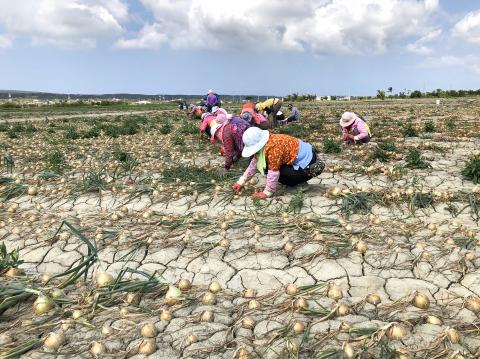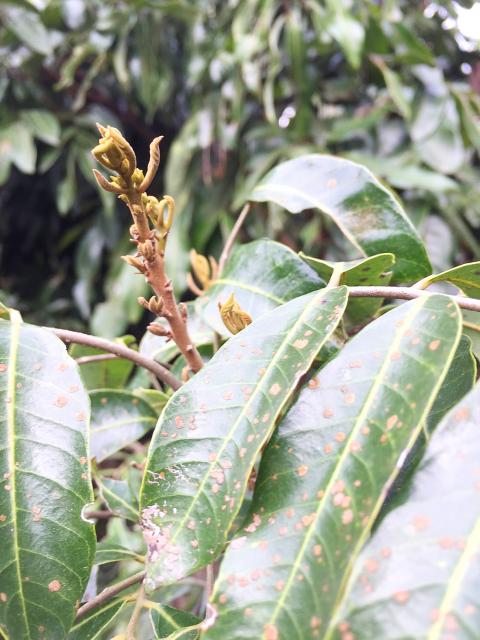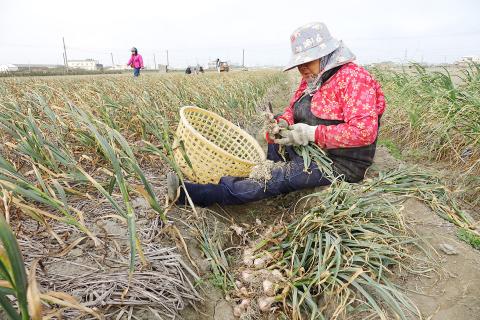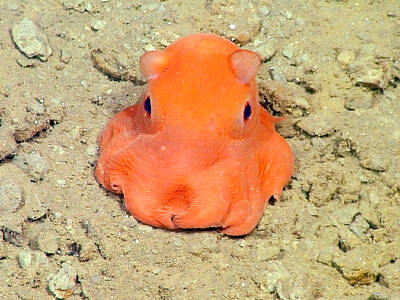This winter has been the hottest for 72 years. High temperatures and low rainfall have affected crop growth. According to Council of Agriculture estimates, lychee farms, covering over 7,000 hectares in total, have been impacted, and the production of onions and garlic has fallen significantly. As a result, price fluctuations for these crops will be inevitable.
High temperatures and water shortages affect crop growth
According to the Agriculture and Food Agency, higher temperatures during warm winters retard crop growth, and water shortages reduce yields. Most seriously affected are onions, garlic and Yuherbao lychees. Pingtung’s Hengchun Peninsula is a major onion-growing area, Yunlin produces garlic, and Kaohsiung and Pingtung are major producers of Yuherbao lychees.

Photo: Tsai Tsung-hsien, Liberty Times
照片:自由時報記者蔡宗憲
The Agriculture and Food Agency says that onions this year are smaller, with the number of large onions 20% lower than previous years, while some garlic bulbs are not fully grown. The Yuherbao variety of lychee has an earlier production season and is usually harvested in May. This time of year is usually the flowering season for the Yuherbao lychee trees, but this year many have yet to flower, due to the high winter temperatures and low rainfall. It is estimated that 6,500 to 7,800 hectares of lychee farms south of Taichung have been impacted.
Lower rainfall means sweeter pineapples
Warm winter and lower rainfall are not necessarily bad for all crops, however. Pineapple farmers in Kaohsiung said that the warm winter and drought increase the enzymes in pineapples. Pineapples are generally 30% sweet and 70% sour, but this year these flavors will be present in equal measure. Also, the pineapples produced this year will have a longer shelf life due to their reduced moisture content. Coffee beans grown in Yunlin’s Gukeng Township, too, are expected to be more plentiful and of better quality this year, as lower rainfall is regarded as conducive to the growth of coffee beans.

Photo: Lin Yi-chang, Liberty Times
照片:自由時報記者林宜樟
(Translated by Lin Lee-kai, Taipei Times)
今年暖冬創下七十二年來新高紀錄,溫度高、雨水少,農作物生長不順。農委會初估荔枝受損面積恐將超過七千公頃,洋蔥、蒜頭產量大減,價格波動恐難免。
高溫缺水 影響農作物生長

Photo: Liu Hsiao-hsin, Liberty Times
照片:自由時報記者劉曉欣
農糧署說明,暖冬影響包含溫度過高,造成農作物生長不順,另有缺水導致產量下跌,目前較嚴重者有洋蔥、蒜頭和玉荷包。洋蔥主要種植地為屏東恆春半島、蒜頭則在雲林,玉荷包為高雄和屏東。
農糧署指出,今年洋蔥「長不大」,大球洋蔥數量減少兩成以上;部分蒜頭生長的球莖也不夠飽滿;玉荷包則是荔枝品種中產季較早,通常五月可採收,但由於高溫缺水,原本這時期應陸續開花,但開花不順,台中以南估計恐將有六千五百到七千八百公頃荔枝園受影響。
水分變少 鳳梨保存更久也更甜
但暖冬少雨對作物也不全然是壞處。高雄鳳梨農說,暖冬乾旱造成酵素多,過去冬天鳳梨三分甜、七分酸,今年半酸半甜,也因鳳梨水分變少,延長保存期限。另雲林古坑地區的咖啡因少雨有利生長,預估咖啡豆產量及品質都會提升。
(自由時報記者簡惠茹、陳文嬋、詹士弘、廖淑玲)

The deep waters off the coast of California are home to a bizarre creature: the flapjack octopus. This creature, known for its pancake-like appearance, spreads itself thin on the seabed as a clever survival strategy, making it difficult for predators to spot and capture it. With its unique, umbrella-shaped body formed by webbed arms, the flapjack octopus moves through the water in a graceful manner. It propels itself forward by rhythmically moving its body and contracting its webbed arms. Its pair of ear-like fins, which move independently yet with remarkable coordination, also help it explore the deep-sea environment. These

Bilingual Story is a fictionalized account. 雙語故事部分內容純屬虛構。 I stand by the Miluo River as dusk falls. The court betrayal is too much. I served Chu with loyalty. I forged alliances and fought corruption. But the whispers of jealous courtiers, the murmurs of treason, spoke louder. The king cast me out. The water looks calm. It promises peace. I step in. The river is cold against my legs. I hear shouts behind me — fishermen calling my name. I keep walking. The calls grow louder, but I do not turn around. The water rises to my chest. It pulls at me. I

In Taiwan, people can use a platform to rent a power washer for a weekend or share unused garage space for someone’s storage needs. These are examples of the sharing economy, a consumption model that has gained widespread adoption worldwide. This approach allows people to rent or share assets like cars, homes or even services, typically through online platforms. This innovative model poses a simple yet powerful question: why purchase infrequently used items when sharing is more practical? By making useful but idle resources accessible, the sharing economy turns them into sustainable opportunities. Internationally, platforms like Airbnb and Uber have popularized

Continued from yesterday(延續自昨日) https://www.taipeitimes.com/News/lang Many people may be familiar with flapjack octopuses thanks to Pearl, a charming character from the Pixar film Finding Nemo. However, her portrayal presents several scientific inaccuracies. In reality, flapjack octopuses are deep-sea creatures, which are unsuitable for the brightly lit shallow reef environment depicted in the film. Their primary defense mechanism relies on their reddish coloration, which would be ineffective in the well-lit shallows. Pearl’s famous line, “You guys made me ink,” is another fictional detail that is not consistent with the observed actions of real flapjack octopuses. As common as it is in many other octopus